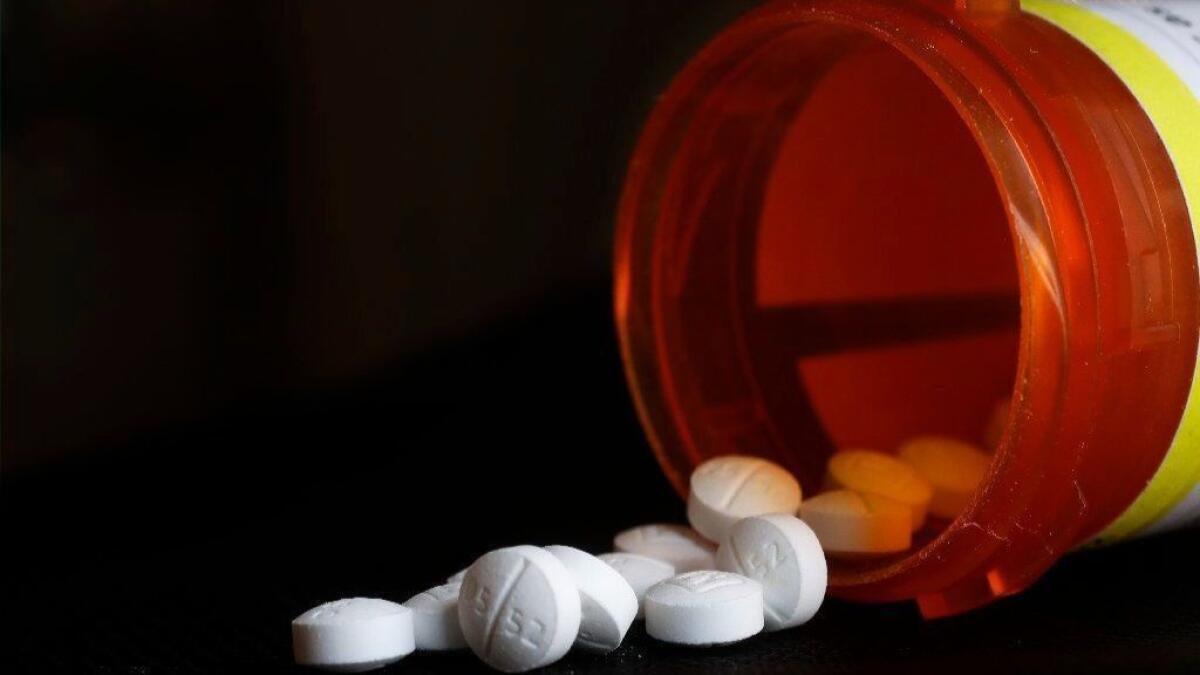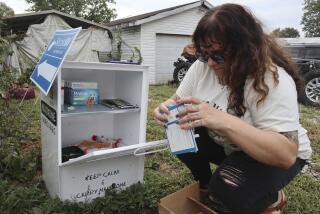12 million pills and 700 deaths: How a few pill mills helped fan the U.S. opioid inferno

- Share via
Reporting from Knoxville, Tenn. — Soon after he took over as medical director of the Urgent Care & Surgery Center in eastern Tennessee in 2012, Dr. Marc Valley realized he was supervising illegal drug dealers in lab coats.
Platoons of patients socialized in the parking lot, none seemingly afflicted by injuries. The packed waiting room echoed with chatter about how and where to score painkillers known as opioids.
Valley discovered that clinic staffers were barely vetting patients. Some charts didn’t even include a diagnosis or pain level, yet patients all seemed to receive the same dosage of powerful opioids.
He worried that dozens risked dying from overdoses. He complained to management and tried to rein in the malpractice. But the operators ignored him. Their only concern, he said, was the money pouring in.
He quit after three months, convinced he was running an illicit pill mill, not a legitimate clinic.
“It was so very sad,” recalled Valley, now 60. “I knew it was wrong, and I walked away. But I can empathize with those who didn’t. It was tempting. There was just so much money.”
After he quit, the pill mill — located in a one-story office beside a state highway in Lenoir City, Tenn., in the shadow of the Great Smoky Mountains — was targeted by federal agents in a three-year investigation of local pain clinics.
The ensuing raids, telephone wiretaps and criminal charges against 140 people provide an unparalleled autopsy of how a handful of pill mills exacerbated the nation’s opioid epidemic during a critical early period in its history.
By the time they were shut down in 2015, four freewheeling clinics had churned out prescriptions for more than 12 million opioid pills and had generated at least $21 million, court records show.
In a rare step, federal authorities combed through medical files and death records, seeking the toll of lives lost — from three of the clinics in the Knoxville area and a predecessor in southern Florida.
They were stunned to discover that more than 700 patients had died, not including those who bought the pills on the secondary black market.
“A significant percentage of those deaths, directly or indirectly,” prosecutors wrote, “were the result of overdosing on narcotics prescribed” by the clinics.
“The opioid crisis wouldn’t be nearly as bad, where it is today, if it weren’t for pill mills like these,” said David Rausch, director of the Tennessee Bureau of Investigation and a former police chief in Knoxville whose officers helped investigate the clinics.
“Some doctors started to see money could be made from prescribing these pills, and they forgot or ignored their responsibility to do no harm,” he added. “They literally devastated communities. To understand the crisis, you have to understand the role these clinics played.”

Like many tragedies involving prescription pain pills, this one began in Florida, during what authorities describe as the Wild West era of prescription opioid fraud.
In the mid-1990s, Purdue Pharma introduced a painkiller called OxyContin, which it billed as a safer and less addictive version of oxycodone, then in widespread use. At the same time, doctors were encouraged by professional groups to aggressively treat pain, and restrictions on prescribing opioids were loosened.
Pain clinics popped up to meet surging demand, and in 2009 the first Urgent Care & Surgery Center opened its doors in Hollywood, Fla., about 20 miles north of Miami. It was owned and operated, court records show, by three South Florida residents: Benjamin Rodriguez, 44, and two men with both U.S. and Italian citizenship — Luca P. Sartini, 59, and Luigi Palma, 53.
The clinic, in a squat building flanked by palm trees, was soon churning through hundreds of patients each month. It charged about $300 per appointment and didn’t take medical insurance, according to court records. Its dispensary charged $700 to fill a typical prescription.
The clinic raked in cash as word spread that it was pumping out pain pills.
Patients arrived in cars and vans from up the East Coast. Many were led by a “sponsor,” a drug dealer who paid for the trip, the clinic visit and the prescriptions in exchange for half the patient’s haul of pills.
It was a lucrative trade-off. Sponsors typically made a $4,000 monthly profit per patient, court records show.
Few of the patients needed painkillers for injuries or illnesses, and many relaxed in the parking lot before appointments, creating what federal agents described as a “party atmosphere.”
The party came to an end after local businesses and community members complained to authorities.
The federal Drug Enforcement Administration sent in undercover investigators in 2010. They got pills with ease. One even got a prescription after boasting he intended to sell the pills on the street.
The DEA raided the office that December. By then, prosecutors allege, Sartini, Palma and Rodriguez were already planning their next move. Authorities were closing in, and Florida was enacting regulations that would make it more difficult to profit from fake pain.
They had little trouble finding a new spot — patient records and license plates in their parking lot pointed them 860 miles north to eastern Tennessee.
Instead of forcing patients to drive hours to their clinics, they would bring their pill mill to the addicts.
In January 2011, they opened shop in Knoxville, a hot zone of opioid addiction and a crossroads of major highways, including Interstate 75. Addicts called I-75 the “Oxy Express” because it was the route they took to pain clinics in Florida.
The owners installed Sylvia Hofstetter, who had helped oversee the Hollywood clinic, to run Comprehensive Healthcare Systems on the second floor of a drab suburban office building.
A doting grandmother, Hofstetter was a tough, demanding boss. Her police mug shot shows a woman with frizzy black hair, arched eyebrows and a sharp nose and cheekbones.
Hofstetter pushed her staff to see too many patients and write too many prescriptions, prosecutors allege.
A physician’s assistant, they wrote, was “so inundated with patients that he rarely left exam rooms” and feared he would be fired “if he did not liberally write opioid prescriptions for as many patients as possible.”
The clinic attracted patients from other states, just like the one in Hollywood, treating 200 to 250 a week. It quickly became “unimaginably profitable,” about $240,000 a month, an FBI agent wrote.
Once again, the flood of patients worried neighboring businesses and they complained to the landlord. The office was forced to close in August 2013.
By then, the Floridians had a backup plan. They transferred their patients to a clinic they had opened two years earlier in Lenoir City, Tenn., a quiet riverfront town about 28 miles southwest of Knoxville.
Hofstetter and the owners didn’t know it, but the clinic in Knoxville was already drawing federal attention. The FBI had launched an investigation, and undercover agents and police posed as patients to get pills.
They didn’t have to try very hard. They were asked few questions and exams were cursory. Staffers barely looked at 3-D imaging reports and ignored screening tests that suggested drug abuse.
During one exam, according to an affidavit, an undercover agent asked why a nurse practitioner was inspecting his arms. She was looking for needle marks, she replied.
“We have a lot of people that shoot up their medications,” she explained, an apparent acknowledgment that patients were misusing the opioids.
Hofstetter soon grew frustrated at not sharing in the profits, prosecutors allege, and she secretly launched a separate pain clinic in Knoxville with a local businessman.
At its peak in mid-2014, Hofstetter’s rival pill mill treated 1,000 patients and was grossing $362,000 a month, court papers show. The pickings were so rich that several of her employees soon quit to start their own pill mill.
Federal authorities raided and shut the three clinics in March 2015. That year, more than 1,000 people died of overdoses from prescription and other opioids, including heroin, in Tennessee.
Since then, state and federal officials have enacted stricter guidelines and regulations that helped reduce the number of pill mills. They also have pushed doctors to more carefully prescribe addictive opioids. Nationwide, painkiller prescriptions have dropped 25% from their peak in 2012.
But it didn’t end the ravages of the opioid crisis. Unable to easily get OxyContin, pill addicts shifted to heroin and potent synthetic opioids like fentanyl.
In 2017, according to the most recent federal data, more than 47,600 people died of opioid overdoses, a 133% increase since the first Urgent Care & Surgery Center opened in Florida a decade ago.
Knoxville is still sorting through the pill mills’ deadly legacy.
Most of the 140 people charged in the investigation pleaded guilty to federal offenses. Hofstetter is scheduled to stand trial in October. Her attorney did not respond to calls or emails seeking comment. Rodriguez, the part-owner, is expected to soon plead guilty in a deal with prosecutors, according to his attorney.
Sartini and Palma fled to Italy to avoid arrest, prosecutors say, and are fighting extradition. Their attorneys could not be reached for comment or did not reply to emails. A spokeswoman for the U.S. attorney’s office for the Eastern District of Tennessee declined to comment.
The barrage of prosecutions has brought little solace to family members of overdose victims.
Justin Sliger, a 33-year-old handyman and drug dealer, died early on Valentine’s Day 2014 in his motel room, next to his two slumbering sons.
It was not the family’s first such tragedy — Sliger’s mother and a stepmother both had died from overdoses of pain pills.
Sliger had begun visiting Hofstetter’s breakaway clinic in Knoxville “to make some money for the family,” his father said.
“I didn’t think he was using enough to kill himself over. … We all took it hard, still do. He loved those boys, and now they won’t ever really get to know him.”
Sliger’s father doesn’t understand why a doctor would prescribed opioids to his son. He wasn’t sick or injured and was dealing pills on the side. But he got prescriptions anyway, all too easily.
More to Read
Sign up for Essential California
The most important California stories and recommendations in your inbox every morning.
You may occasionally receive promotional content from the Los Angeles Times.











